March 30, 2021
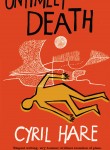 It’s been just over two years (what a two years though!) since I last posted my only-other-so-far Cocktail Talk from Cyril Hare, the early-to-mid-last-century English writer and judge – be sure to read that When the Wind Blows Cocktail Talk to discover his real name! – who was known for his subtle humor, classic stylings, and draw-you-in-mysteries. I just picked up, as I slowly find more and more of his work, Untimely Death, which starts on a vacation to Exmoor, and picks up his sometimes-used Inspector Mallett (retired here) along the way. There evocative landscape and character description, a murder (‘natch) that isn’t solved until the last chapter, twists, turns, and memorable characters. You’ll like it! Especially if you like sherry (and surely you must), as it’s a book that should be sherry accompanied – both when reading the below quote, and the rest of the book.
It’s been just over two years (what a two years though!) since I last posted my only-other-so-far Cocktail Talk from Cyril Hare, the early-to-mid-last-century English writer and judge – be sure to read that When the Wind Blows Cocktail Talk to discover his real name! – who was known for his subtle humor, classic stylings, and draw-you-in-mysteries. I just picked up, as I slowly find more and more of his work, Untimely Death, which starts on a vacation to Exmoor, and picks up his sometimes-used Inspector Mallett (retired here) along the way. There evocative landscape and character description, a murder (‘natch) that isn’t solved until the last chapter, twists, turns, and memorable characters. You’ll like it! Especially if you like sherry (and surely you must), as it’s a book that should be sherry accompanied – both when reading the below quote, and the rest of the book.
“I’ve been having a chat with the Detective Inspector,” he said. “Luckily we’re on fairly good terms.” He filled three glasses with sherry and handed them round. “Inquest’s on Thursday, it seems. At Polton. Your very good healths, sir and madam.”
The sherry was of a quality to command Pettigrew’s respect, but for the moment his mind was on lower things.
“What else did he tell you?” he asked.
–Cyril Hare, Untimely Death
March 16, 2021
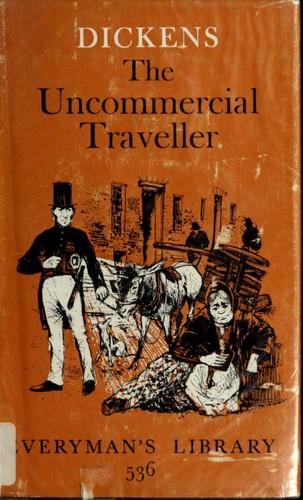 I have a tear in my eye, as while I could probably have a fair more Cocktail Talks from the Charlie Dickens collection of essays The Uncommercial Traveller, for now (but perhaps not forever), this will our last one. If you’ve missed any of the previous four, then be sure to read The Uncommercial Traveller Cocktail Talks Part 1, Part II, Part III, and Part IV, and while you’re in the reading mood, check out all the Dickens Cocktail Talks. Don’t read so much that your eyes tire, however, as you won’t want to miss the below quote. From one of the laugh-out-loud-ier pieces in the collection (and there are many funny scenes throughout, so that’s saying something), called “A Little Dinner in an Hour,” the below quote is just a small part of a regrettable dining experience Dickens has with his pal Bullfinch, when they are traveling for some business and decide to book a meal at a local spot that once was rumored to be worthy. But now leaves much to be desired! Ah, I wish I could have been there to watch it all unfold (if not to actually partake in it). A fine end to our Cocktail Talk tour through the book. Sherry, please!
I have a tear in my eye, as while I could probably have a fair more Cocktail Talks from the Charlie Dickens collection of essays The Uncommercial Traveller, for now (but perhaps not forever), this will our last one. If you’ve missed any of the previous four, then be sure to read The Uncommercial Traveller Cocktail Talks Part 1, Part II, Part III, and Part IV, and while you’re in the reading mood, check out all the Dickens Cocktail Talks. Don’t read so much that your eyes tire, however, as you won’t want to miss the below quote. From one of the laugh-out-loud-ier pieces in the collection (and there are many funny scenes throughout, so that’s saying something), called “A Little Dinner in an Hour,” the below quote is just a small part of a regrettable dining experience Dickens has with his pal Bullfinch, when they are traveling for some business and decide to book a meal at a local spot that once was rumored to be worthy. But now leaves much to be desired! Ah, I wish I could have been there to watch it all unfold (if not to actually partake in it). A fine end to our Cocktail Talk tour through the book. Sherry, please!
‘It’s quite impossible to do it, gentlemen,’ murmured the waiter; ‘and the kitchen is so far off.’
‘Well, you don’t keep the house; it’s not your fault, we suppose. Bring some sherry.’
‘Waiter!’ from Mr. Indignation Cocker, with a new and burning sense of injury upon him.
The waiter, arrested on his way to our sherry, stopped short, and came back to see what was wrong now.
‘Will you look here? This is worse than before. Do you understand? Here’s yesterday’s sherry, one and eightpence, and here we are again two shillings. And what the devil does ninepence mean?’
This new portent utterly confounded the waiter. He wrung his napkin, and mutely appealed to the ceiling.
‘Waiter, fetch that sherry,’ says Bullfinch, in open wrath and revolt.
‘I want to know,’ persisted Mr. Indignation Cocker, ‘the meaning of ninepence. I want to know the meaning of sherry one and eightpence yesterday, and of here we are again two shillings. Send somebody.’
The distracted waiter got out of the room on pretext of sending somebody, and by that means got our wine. But the instant he appeared with our decanter, Mr. Indignation Cocker descended on him again.
‘Waiter!’
— Charles Dickens, The Uncommercial Traveller
February 19, 2021
You know (cause I’ve mentioned it before and you’ve memorized every word I ever typed, which is a bit, oh, nice but also maybe makes me wonder if you need to get out more, which is, I realize, a bit difficult to do right now, but I’m wandering) I sometimes like to go to my liquor/cocktail book shelves, grab a book at random, and then make a drink from said book. But you may not know that on rare occasions I do the same, but instead of the shelves go to a little container I have of drink-related, let’s call them pamphlets, or little soft-back-y things, mini-books perhaps. A lot of these used to float around, and some still do, but in their late 50s, 60s, maybe even early 70s heydays, lots of liquor brands, and even some stores, used to make these, doll them up, and use them as recipe-filled promo pieces. Neat, right? I have a stack, not a large stack, but a stack, and just reached into it and pulled out a pretty one called Come for Cocktails. Published by The Taylor Wine Company in 1958, it leans as heavily towards food recipes as drinks, and is squarely in the “more entertaining is better” camp, one I agree with (when pandemics make such a thing safe). It has some recipes you’d expect, some you might not, and some really sweet illustrations, including this jolly jumping shrimp one:
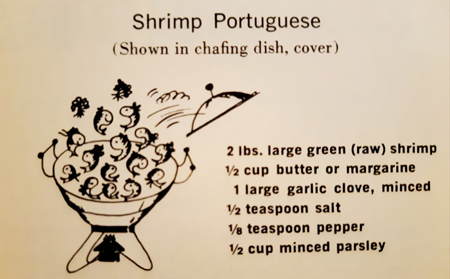
And this dancing sherry and glasses one:
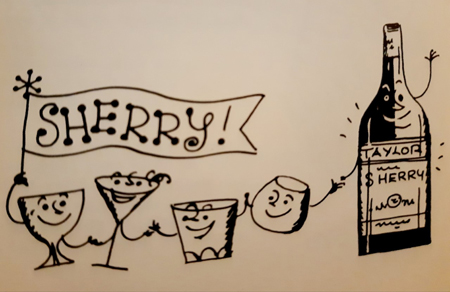
The latter one is important to us here and now, as the drink I picked to make from our Come for Cocktails mini-book is called The 6 O’clock Cocktail, and features sherry, along with equal parts sweet and dry vermouth. There has to be (I’m wracking my brain, but my brain is old and full of cocktails) a drink with a different name that has equal parts of these three lovelies, right? There are the classic Adonis and Bamboo cocktails with sherry and one each of our vermouth pair naturally. But both with a different name? I can’t recall, but really, it doesn’t matter that much, or enough to stop me drinking this perfectly-balanced beaut, which lets all those herb-y, nut-y, botanical-y scents and tastes play around the palate like a dance party. A lot depends on what variety of such you use. Sadly, in a way, I did not use Taylor branded sherry and vermouth – which I think has been lost to the liquor shelves of time. I did use Punt e’ Mes Italian vermouth (I felt its drier, herb-forward umph would be good), Dolin dry vermouth (cause I like it), and Williams & Humbert Dry Sack medium sherry, which is a dandy nutty mixing sherry. Altogether: yummy. Try it, and next time you pass a rack of booze-pamphlets in your house or a used bookstore or antique mart, maybe pick one up and make a drink from it. It worked for me!
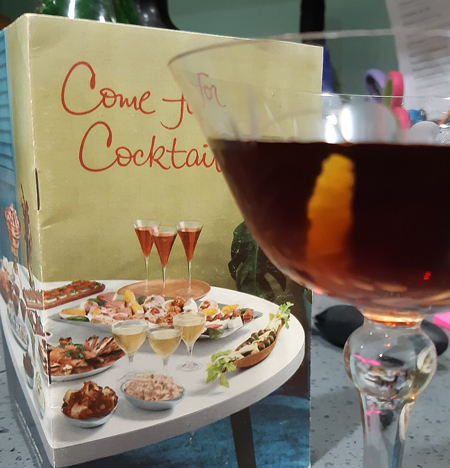
The 6 O’clock cocktail
Cracked ice
1 ounce dry vermouth
1 ounce sweet vermouth
1 ounce sherry
Lemon twist, for garnish
1. Fill a mixing glass or cocktail shaker halfway full with cracked ice. Add our trio of liquids. Stir well.
2. Strain into a cocktail glass, and garnish with the lemon twist.
Tags: cocktail, Cocktail Recipes, Come for Cocktails, dancing sherry, dancing shrimp, dry vermouth, Friday Night Cocktail, lemon twist, low abv cocktail, sherry, sweet vermouth, The 6 O’clock Cocktail, What I’m Drinking
Posted in: Cocktail Recipes, Recipes, Sherry, vermouth, What I'm Drinking
January 19, 2021
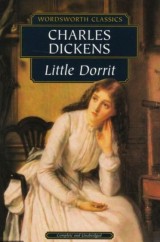 Hello Dickens fans (which I hope is everyone)! And let me just jump right in to our third quote from the immortal Dickens book Little Dorrit. Well, first, let me point you to the Little Dorrit Part I Cocktail Talk, and the Little Dorrit Part II Cocktail Talk, and for that matter, all the Charles Dickens Cocktail Talks, in case you want or get a little more book story, or read more quotes, or both! Here, we have a bit about sherry (our second sherry from the book, but it was rather popular at the time) and a bit about a character in the book that seems serene and such, but is actually a bit of a villain. There are layers of villainy in Dickens as in life, and that’s all I’m gonna say cause really, you should read the book! After the below quote of course.
Hello Dickens fans (which I hope is everyone)! And let me just jump right in to our third quote from the immortal Dickens book Little Dorrit. Well, first, let me point you to the Little Dorrit Part I Cocktail Talk, and the Little Dorrit Part II Cocktail Talk, and for that matter, all the Charles Dickens Cocktail Talks, in case you want or get a little more book story, or read more quotes, or both! Here, we have a bit about sherry (our second sherry from the book, but it was rather popular at the time) and a bit about a character in the book that seems serene and such, but is actually a bit of a villain. There are layers of villainy in Dickens as in life, and that’s all I’m gonna say cause really, you should read the book! After the below quote of course.
The Patriarchal state, always a state of calmness and composure, was so particularly serene that evening as to be provoking. Everybody else within the bills of mortality was hot; but the Patriarch was perfectly cool. Everybody was thirsty, and the Patriarch was drinking. There was a fragrance of limes or lemons about him; and he made a drink of golden sherry, which shone in a large tumbler as if he were drinking the evening sunshine. This was bad, but not the worst. The worst was, that with his big blue eyes, and his polished head, and his long white hair, and his bottle-green legs stretched out before him, terminating in his easy shoes easily crossed at the instep, he had a radiant appearance of having in his extensive benevolence made the drink for the human species, while he himself wanted nothing but his own milk of human kindness.
–Charles Dickens, Little Dorrit
January 12, 2021
 As mentioned just two weeks ago right here on the Spiked Punch blog, we’re going into a little turn through the Dickens’ classic Little Dorrit, a book I hadn’t featured here (some how?) until just that post two weeks ago (by the way, don’t miss the Little Dorrit Cocktail Talk Part I, so you can catch a little more about the book, and be sure to see all the Dickens Cocktail Talks to learn more about my love for Dickens and his love of drinks, pubs, drinkers, and dogs). In this particular quote, there’s a character named by his profession (which happens some in this book, to swell effect), and some sherry (which also happens), which is turned into a cocktail of sorts, which I am all for, as, I hope, are you.
As mentioned just two weeks ago right here on the Spiked Punch blog, we’re going into a little turn through the Dickens’ classic Little Dorrit, a book I hadn’t featured here (some how?) until just that post two weeks ago (by the way, don’t miss the Little Dorrit Cocktail Talk Part I, so you can catch a little more about the book, and be sure to see all the Dickens Cocktail Talks to learn more about my love for Dickens and his love of drinks, pubs, drinkers, and dogs). In this particular quote, there’s a character named by his profession (which happens some in this book, to swell effect), and some sherry (which also happens), which is turned into a cocktail of sorts, which I am all for, as, I hope, are you.
Bishop said that when he was a young man, and had fallen for a brief space into the habit of writing sermons on Saturdays, a habit which all young sons of the church should sedulously avoid, he had frequently been sensible of a depression, arising as he supposed from an over-taxed intellect, upon which the yolk of a new-laid egg, beaten up by the good woman in whose house he at that time lodged, with a glass of sound sherry, nutmeg, and powdered sugar acted like a charm. Without presuming to offer so simple a remedy to the consideration of so profound a professor of the great healing art, he would venture to inquire whether the strain, being by way of intricate calculations, the spirits might not (humanly speaking) be restored to their tone by a gentle and yet generous stimulant?
–Charles Dickens, Little Dorrit
Tags: a gentle and yet generous stimulant, Charles Dickens, Cocktail Talk, egg, Little Dorrit, nutmeg, Part II, powdered sugar, sherry
Posted in: Charles Dickens, Cocktail Talk, Sherry
December 29, 2020
 I can’t believe it’s the end of 2020 (a crappy year, as you know, with some redeeming factors), which means there have been, well, 2,020 years plus a few more years of recorded Western history (I’m not here to debate history, and realize I’m generalizing in a big way, but hey, I write about drinks), and in all those years I haven’t had a Cocktail Talk from the immortal Dicken’s classic Little Dorrit! That’s an outrage! What have I been thinking? I haven’t, obviously. While Little Dorrit isn’t my all-time favorite Dickens, it’s definitely in the middle-high range, and as I love most all Dickens books a heck of a lot, that’s saying something! Be sure to read all the Dickens Cocktail Talks to hear more. But be sure to come back, too, cause you don’t want to miss these quotes from Dickens fairly-dark novel that’s unflinching in its views of his society (which is remarkably like ours, in some sad ways), while still being wonderfully comic, character-driven, lyric, and descriptive, with layers of stories that disconnect and then connect again and characters you won’t easily forget. Dickens! And, of course, there are some drinks, as he liked drinks and pubs like few other authors. Our first Little Dorrit Cocktail Talk – and there will be more, don’t you fret – features the hero (in a way of speaking) of the book, Arthur Clennam, sitting down for dinner with a now-much-changed love from his youth, and with her father.
I can’t believe it’s the end of 2020 (a crappy year, as you know, with some redeeming factors), which means there have been, well, 2,020 years plus a few more years of recorded Western history (I’m not here to debate history, and realize I’m generalizing in a big way, but hey, I write about drinks), and in all those years I haven’t had a Cocktail Talk from the immortal Dicken’s classic Little Dorrit! That’s an outrage! What have I been thinking? I haven’t, obviously. While Little Dorrit isn’t my all-time favorite Dickens, it’s definitely in the middle-high range, and as I love most all Dickens books a heck of a lot, that’s saying something! Be sure to read all the Dickens Cocktail Talks to hear more. But be sure to come back, too, cause you don’t want to miss these quotes from Dickens fairly-dark novel that’s unflinching in its views of his society (which is remarkably like ours, in some sad ways), while still being wonderfully comic, character-driven, lyric, and descriptive, with layers of stories that disconnect and then connect again and characters you won’t easily forget. Dickens! And, of course, there are some drinks, as he liked drinks and pubs like few other authors. Our first Little Dorrit Cocktail Talk – and there will be more, don’t you fret – features the hero (in a way of speaking) of the book, Arthur Clennam, sitting down for dinner with a now-much-changed love from his youth, and with her father.
Once upon a time Clennam had sat at that table taking no heed of anything but Flora; now the principal heed he took of Flora was to observe, against his will, that she was very fond of porter, that she combined a great deal of sherry with sentiment, and that if she were a little overgrown, it was upon substantial grounds. The last of the Patriarchs had always been a mighty eater, and he disposed of an immense quantity of solid food with the benignity of a good soul who was feeding some one else.
— Charles Dickens, Little Dorrit
Tags: Arthur Clennam, Charles Dickens, Cocktail Talk, Little Dorrit, Part I, port, she combined a great deal of sherry with sentiment, sherry
Posted in: beer, Charles Dickens, Cocktail Talk, Sherry
October 6, 2020
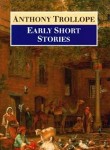 Recently, I had a Cocktail Talk from a story within the Anthony Trollope collection called, easily enough, Early Short Stories, a collection I picked up not long before that posting, thereby getting my complete Trollope collection that much closer to actual completion (and it’s pretty close!). Just to take a peek into the breadth of the Trollopean shelves, don’t miss the past Anthony Trollope Cocktail Talk posts, and for that matter don’t miss the Negus-packed Early Short Stories Part I post. But don’t miss this one, either, which takes place in Spain, which we visit alongside our English narrator. It’s one of my favorite stories in the collection, a comedy story of sorts, but also with the eye for detail and place most Trollope stories contain, and having the nice below sherry description.
Recently, I had a Cocktail Talk from a story within the Anthony Trollope collection called, easily enough, Early Short Stories, a collection I picked up not long before that posting, thereby getting my complete Trollope collection that much closer to actual completion (and it’s pretty close!). Just to take a peek into the breadth of the Trollopean shelves, don’t miss the past Anthony Trollope Cocktail Talk posts, and for that matter don’t miss the Negus-packed Early Short Stories Part I post. But don’t miss this one, either, which takes place in Spain, which we visit alongside our English narrator. It’s one of my favorite stories in the collection, a comedy story of sorts, but also with the eye for detail and place most Trollope stories contain, and having the nice below sherry description.
I landed at Cadiz, and was there joined by an old family friend, one of the very best fellows that ever lived. He was to accompany me up as far as Seville; and, as he had lived for a year or two at Xeres, was supposed to be more Spanish almost than a Spaniard. His name was Johnson, and he was in the wine trade; and whether for travelling or whether for staying at home—whether for paying you a visit in your own house, or whether for entertaining you in his—there never was (and I am prepared to maintain there never will be) a stauncher friend, choicer companion, or a safer guide than Thomas Johnson. Words cannot produce a eulogium sufficient for his merits. But, as I have since learned, he was not quite so Spanish as I had imagined. Three years among the bodegas of Xeres had taught him, no doubt, to appreciate the exact twang of a good, dry sherry; but not, as I now conceive, the exactest flavour of the true Spanish character. I was very lucky, however, in meeting such a friend, and now reckon him as one of the staunchest allies of the house of Pomfret, Daguilar, and Pomfret.
–Anthony Trollope, “John Bull On The Guadalquivir”
September 15, 2020
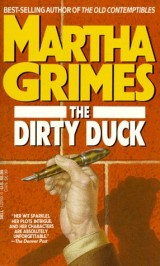 Not too long ago (if you consider the amount of time within all of time, for sure) I had a couple Cocktail Talks from a book by Martha Grimes called The Man With a Load of Mischief, a book I liked pretty well. Not sure why (as this often happens) I didn’t search out more books by Martha G at the time, but, well, I didn’t. However, recently (being at home more and thereby reading more) I was scouring the shelves for a book to re-read, and I picked up said Load, and liked it again. It – as it seems all her books starring Scotland Yard’s Richard Jury – is very pub-focused, which I also like (pubs, that is! and pub-focused books), and so decided I’d keep my eyes open for more. And, low and behold, with open eyes I found one, called The Dirty Duck. Now, Grimes in the book-back blurbs gets compared at times to Agatha Christie, and while she isn’t anywhere for me as good as the best Agatha, she may not be as bad as the worst Agatha either (cause when Agatha goes off the mark, it can be far off). With that said, The Dirty Duck isn’t a bad read. It’s a little, oh, lazy at times, and a little dated for being 1984 (though that was, now that I think about it, a ways behind us in time), but it’s also a lot of fun, has some pretty neat twists and a good mystery, and is very readable. Best of all – it takes place in Stratford Upon Avon! At least for the main, and you probably can guess that means lots of Shakespeare, which I’m always for, and also the main pub (the Dirty Duck pub, that is) is one I know, and one that features mightily (under the name The Mucky Mallard) in the tv show Shakespeare and Hathaway, which I am mightily (two “mightily”s!) fond of. If that wasn’t enough to get you going, the Thomas Nashe poem “Litany in a Time of Plague” provided key clues, and is not only a swell poem, but incredibly apt right now with our own plague. And if that wasn’t enough, there are some good drinking quotes in the book, starting with the below.
Not too long ago (if you consider the amount of time within all of time, for sure) I had a couple Cocktail Talks from a book by Martha Grimes called The Man With a Load of Mischief, a book I liked pretty well. Not sure why (as this often happens) I didn’t search out more books by Martha G at the time, but, well, I didn’t. However, recently (being at home more and thereby reading more) I was scouring the shelves for a book to re-read, and I picked up said Load, and liked it again. It – as it seems all her books starring Scotland Yard’s Richard Jury – is very pub-focused, which I also like (pubs, that is! and pub-focused books), and so decided I’d keep my eyes open for more. And, low and behold, with open eyes I found one, called The Dirty Duck. Now, Grimes in the book-back blurbs gets compared at times to Agatha Christie, and while she isn’t anywhere for me as good as the best Agatha, she may not be as bad as the worst Agatha either (cause when Agatha goes off the mark, it can be far off). With that said, The Dirty Duck isn’t a bad read. It’s a little, oh, lazy at times, and a little dated for being 1984 (though that was, now that I think about it, a ways behind us in time), but it’s also a lot of fun, has some pretty neat twists and a good mystery, and is very readable. Best of all – it takes place in Stratford Upon Avon! At least for the main, and you probably can guess that means lots of Shakespeare, which I’m always for, and also the main pub (the Dirty Duck pub, that is) is one I know, and one that features mightily (under the name The Mucky Mallard) in the tv show Shakespeare and Hathaway, which I am mightily (two “mightily”s!) fond of. If that wasn’t enough to get you going, the Thomas Nashe poem “Litany in a Time of Plague” provided key clues, and is not only a swell poem, but incredibly apt right now with our own plague. And if that wasn’t enough, there are some good drinking quotes in the book, starting with the below.
One of these Americans, Miss Gwendolyn Bracegirdle, who had never had more than an ounce of sweet sherry at a time on the veranda of her huge pink-stuccoed house in Sarasota, Florida, was standing with a friend in a shadowy corner of the terrace getting sloshed.
“Oh honey, not another! This here’s my second – what do they call it?”
“Gin.” Her companion laughed.
“Gin!” She giggled. “I definitely couldn’t.” But she held her glass in a way that said she definitely could.
–Martha Grimes, The Dirty Duck
Tags: Bars, Cocktail Talk, Father Brown Part II, Gin, Litany in a Time of Plague, Martha Grimes, pubs, Stratford Upon Avon, sweet sherry, The Dirty Duck
Posted in: Bars, Cocktail Talk, Gin, Sherry
 It’s been just over two years (what a two years though!) since I last posted my only-other-so-far Cocktail Talk from Cyril Hare, the early-to-mid-last-century English writer and judge – be sure to read that When the Wind Blows Cocktail Talk to discover his real name! – who was known for his subtle humor, classic stylings, and draw-you-in-mysteries. I just picked up, as I slowly find more and more of his work, Untimely Death, which starts on a vacation to Exmoor, and picks up his sometimes-used Inspector Mallett (retired here) along the way. There evocative landscape and character description, a murder (‘natch) that isn’t solved until the last chapter, twists, turns, and memorable characters. You’ll like it! Especially if you like sherry (and surely you must), as it’s a book that should be sherry accompanied – both when reading the below quote, and the rest of the book.
It’s been just over two years (what a two years though!) since I last posted my only-other-so-far Cocktail Talk from Cyril Hare, the early-to-mid-last-century English writer and judge – be sure to read that When the Wind Blows Cocktail Talk to discover his real name! – who was known for his subtle humor, classic stylings, and draw-you-in-mysteries. I just picked up, as I slowly find more and more of his work, Untimely Death, which starts on a vacation to Exmoor, and picks up his sometimes-used Inspector Mallett (retired here) along the way. There evocative landscape and character description, a murder (‘natch) that isn’t solved until the last chapter, twists, turns, and memorable characters. You’ll like it! Especially if you like sherry (and surely you must), as it’s a book that should be sherry accompanied – both when reading the below quote, and the rest of the book.



























